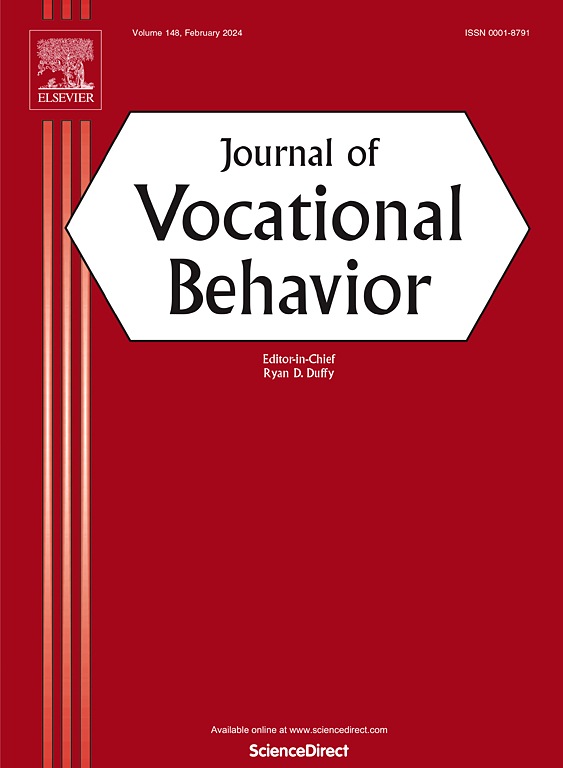Family recognition of work as a source of meaningful work: Examining the roles of self-esteem and parental status
IF 5.2
1区 心理学
Q1 PSYCHOLOGY, APPLIED
引用次数: 0
Abstract
Research on meaningful work has highlighted social context as an important source of meaningful work but has primarily focused on the social context at work. This is surprising, given that much of the work-family research showed that family can enrich work experiences. To address this noticeable gap, this paper introduces the concept of ‘family recognition of work’ – a perception of family recognizing and appreciating one's work – as a critical, non-work-related social context contributing to meaningful work. Drawing on interpersonal sense-making theory, we argue that family recognition of work positively enhances meaningful work via increased self-esteem. Acknowledging shifts in life priorities and values when entering parenthood, we also argue that the indirect effect of family recognition of work on meaningful work via self-esteem is moderated by parental status. To test these hypotheses, we conducted two studies. In Study 1, a five-item scale for family recognition of work was developed and validated, utilizing two UK-based samples (N = 196 and N = 210). In Study 2, a cross-lagged panel analysis was conducted with the three-wave survey data from the UK (N = 466) to test the hypothesized model. The results of Study 2 confirmed a positive relationship between family recognition of work and work meaningfulness, and that this relationship was mediated by self-esteem. Additionally, parents, compared to non-parents, exhibited a stronger indirect effect of family recognition of work on work meaningfulness via self-esteem. The paper extends the literature on social context as a source of meaningful work by demonstrating the importance of family recognition of work.
家庭承认工作是有意义的工作的来源:检查自尊和父母地位的作用
关于有意义工作的研究强调社会环境是有意义工作的重要来源,但主要集中在工作中的社会环境。这是令人惊讶的,因为许多关于工作与家庭的研究表明,家庭可以丰富工作经验。为了解决这一明显的差距,本文引入了“家庭对工作的认可”的概念——家庭对工作的认可和欣赏——作为一种关键的、与工作无关的社会环境,有助于有意义的工作。根据人际意义形成理论,我们认为家庭对工作的认可通过增加自尊积极地促进有意义的工作。承认生活优先级和价值观在成为父母时的转变,我们还认为家庭通过自尊对有意义工作的认可的间接影响受到父母地位的调节。为了验证这些假设,我们进行了两项研究。在研究1中,利用两个英国样本(N = 196和N = 210),开发并验证了一个五项家庭工作认可量表。在研究2中,我们使用来自英国的三波调查数据(N = 466)进行交叉滞后面板分析来检验假设模型。研究2的结果证实了家庭对工作的认可与工作意义之间存在正相关关系,并且这种关系是由自尊介导的。此外,与非父母相比,父母通过自尊对工作意义的家庭认可表现出更强的间接影响。本文通过展示家庭对工作的认可的重要性,扩展了社会背景作为有意义工作来源的文献。
本文章由计算机程序翻译,如有差异,请以英文原文为准。
求助全文
约1分钟内获得全文
求助全文
来源期刊

Journal of Vocational Behavior
PSYCHOLOGY, APPLIED-
CiteScore
13.10
自引率
5.40%
发文量
85
期刊介绍:
The Journal of Vocational Behavior publishes original empirical and theoretical articles offering unique insights into the realms of career choice, career development, and work adjustment across the lifespan. These contributions are not only valuable for academic exploration but also find applications in counseling and career development programs across diverse sectors such as colleges, universities, business, industry, government, and the military.
The primary focus of the journal centers on individual decision-making regarding work and careers, prioritizing investigations into personal career choices rather than organizational or employer-level variables. Example topics encompass a broad range, from initial career choices (e.g., choice of major, initial work or organization selection, organizational attraction) to the development of a career, work transitions, work-family management, and attitudes within the workplace (such as work commitment, multiple role management, and turnover).
 求助内容:
求助内容: 应助结果提醒方式:
应助结果提醒方式:


